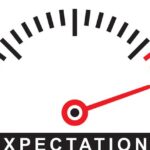Setting expectations for your ski racing children is an essential responsibility to help your children ski their fastest and achieve their goals. Expectations communicate messages to your children about what’s important to you and establish a standard toward which your children can strive. But expectations can be double-edged swords. They can be a tremendous benefit to your children’s ski racing development or they can be weighty burdens that crush their spirits and self-esteem, depending on what types of expectations you set for them.
Expectations That Hurt
There are two types of expectations that you shouldn’t set for your children: ability and outcome expectations. Ability expectations are those in which your children get the message that you expect them to achieve a certain result because of their natural ability, “We expect you to win the race today because you’re the most talented racer out there.” The problem with these messages is that your children have no control over their ability. Children are born with a certain amount of ability and all they can do is maximize whatever ability they are given. The fact is that if your children aren’t meeting your ability expectations in their ski racing, you have no one to blame but yourself—you didn’t give them good enough genes! Plus, your children have no control over their ability, so it is pointless to even talk about it. Another problem with ability expectations is that if children attribute their successes to their ability—“I won because I’m so gifted,”—they must attribute their failures to their lack of ability—“I was slow because I’m terrible.”
Our competitive sports culture also conveys the message that results matter above all else. As a consequence, parents often set outcome expectations in which the message is that their children must produce a certain result—“We expect you to qualify for the Nor-Ams this weekend”— or they will be failures. The problem is that, once again, you are asking your children to meet an expectation over which they may not have control. They might ski to the best of their ability in a race, but still not meet your outcome expectations because other racers just happened to do better than they did. So they would have to consider themselves as failures despite their good skiing. Contrary to what you may believe, ability and outcome expectations actually hinder your children’s development as ski racers.
But Results Do Matter!
Now you might be thinking, “Wait a minute! I can’t push my kids to get good results in their ski racing? No way I’m buying this one.” Before you jump all over me, give me some latitude to bring all these ideas back to the real world.
Here is a simple reality that we all recognize in our culture: results matter! No two ways about it, in most parts of our society, the message that children get is that their success is judged on the results they produce: victories, FIS points, qualifying for a higher level of races. Though it would be great if children were rewarded for their good intentions or efforts, that is not the way the world works. Unfortunately, this societal message can cause parents to place their desire for their children to get results in the short run ahead of their long-term development, the result of which is interference rather than encouragement in their children’s growth as ski racers.
I would recommend that you give up outcome expectations all together, but still give your children outcome “somethings.” Those somethings I refer to are outcome goals. Goals are very different from expectations. Outcome expectations are often set by parents and placed in front of their children without their consultation or “buy in.” There is almost always an implied threat with outcome expectations: “If you don’t live up to our expectations, we won’t love you.” And kids often feel dragged—sometimes kicking and screaming—toward those expectations. Children have no ownership of expectations and little motivation, outside of that implied threat from their parents, to fulfill the expectations. When I ask children about expectations, they usually grimace and send a very clear message, “They’re telling me what to do and I better do it or I’ll get into trouble.” Not exactly “feel-good” parenting! The message of outcome expectations are also black and white; your children either meet the expectation and succeed or they don’t and they fail. So there is very little opportunity for success and lots of room for failure.
Goals are very different. One of the great joys in life is to set a goal, work toward a goal, and achieve a goal. Children have ownership of their goals and want to set and strive toward goals for themselves, with guidance from parents and coaches. For example, “My goal is finish in the top 20 in my age group in slalom this year.” One great thing about goals is that they aren’t black and white, but about degree of attainment. Not every goal can be achieved, but there will almost always be improvement toward a goal and that progress defines success. So, if your children give their best effort, there is little chance of failure and great opportunity for success. When I ask kids about goals, they convey a very different message. Their faces perk up and they say things like, “It means I decide to do something and I want to really work hard to do it.”
For example, a racer’s parents established an outcome expectation of making the podium at the J2 Nationals in GS this year after finishing 12th last year. If she ends up 6th, then she would have failed to meet the outcome expectation. But if she set an outcome goal of a podium, even though that goal wasn’t fully realized, she would still see the 6th place finish as a success because of the substantial improvement she made over her previous result. When you send messages of goals rather than expectations to your children, you foster rather than inhibit their sense of competence.
So if you’re going to send messages about outcome somethings, make sure they are outcome goals, but then immediately send other messages that encourage your children to focus on the process, that is, what they need to do to ski their best.
Effort Expectations
If you want your children to become as successful as they can be in their ski racing, you should communicate messages about effort expectations, over which they have control and that actually encourage them to do what it takes to achieve the outcomes you want. These expectations are also within your children’s control. If your children feel that they have the tools to ski their best, they are much more likely to embrace and pursue their goals. Think about what your children need to do to ski well and create effort expectations that will lead them in that direction: commitment, positive attitude, hard work, discipline, patience, focus, persistence, perseverance.
If your children meet the effort expectations, they will, in all likelihood, experience the intrinsic rewards garnered from their efforts and have some degree of success (how much depends on the genes you gave them). If your children don’t meet the effort expectations, they will be disappointed. But rather than being crushed by the failure, they will know that they have the power to fulfill the expectations and find success in the future.
This blog post is excerpted from my third parenting book, Your Children are Listening: Nine Messages They Need to Hear from You (The Experiment Publishing, 2011).






